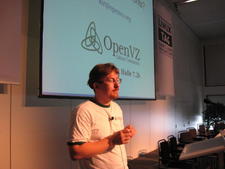LinuxTag 2009: Resource Management with OpenVZ
OpenVZ project leader Kir Kolyshkin clarified at LinuxTag 2009 that the software also lends itself to Linux resource management.
The facts are clear, Koyshkin said at the outset: every computer has but finite resources such as CPU time, memory, hard disk size and I/O, and network I/O. Administrators are interested in protecting these resources from DoS attacks so that they can continue providing QoS or simple processing.
The Linux kernel already provides resource management tools, said Kolyshkin: disk quotas, nice and renice, the real-time priority queue and limits on CPU time with ulimit -c. Ulimit alone controls 16 different parameters. However, Kolyshkin doesn't find this pallet to be enough. Some limits can't be set and the others are done so at login and can't subsequently be regulated. This is where Kolyshkin brought OpenVZ into the picture. The software allows creating multiple isolated userspace instances, called containers, on a single kernel. Webhosters, for example, could use these containers for their services. From a resource management viewpoint, containers are simply groups of processes.

OpenVZ brings its own resource control mechanisms, called beancounters, that have access to 20 parameters modifiable for process groups at runtime. These groups can be containers, users or applications. For example, the Apache 2 webserver has many processes that could more sensibly combined into application groups. OpenVZ categorizes these user beancounters (UBCs) on its wiki page.
Kolyshkin revealed that further mainline kernel control mechanisms are available through control groups (cgroups) developed over the years by the big iron folks at Bull and SGI. Paul Menage was responsible for bringing cgroups into the Linux kernel for grouping processes for binding memory controllers. Cgroups, however, don't offer as many features as OpenVZ's beancounters, although Kolyshkin wishes for future OpenVZ features such as shared pages accounting, I/O priorities per cgroup and checkpoint/recreate. The latter freezes the state of a group and is used by container or virtualization software such as OpenVZ and Xen for live migration. Further details are in the /usr/src/linux/Documentation/cgroups/* and /controllers/* directories of the kernel source code.
Kolyshkin would love to see the OpenVZ container features integrated into the mainline kernel, but that will "take years." But he's thinking of the future: integration of checkpoint/recreate in the official Linux kernel.
Subscribe to our Linux Newsletters
Find Linux and Open Source Jobs
Subscribe to our ADMIN Newsletters
Support Our Work
Linux Magazine content is made possible with support from readers like you. Please consider contributing when you’ve found an article to be beneficial.

News
-
Introducing matrixOS, an Immutable Gentoo-Based Linux Distro
It was only a matter of time before a developer decided one of the most challenging Linux distributions needed to be immutable.
-
Chaos Comes to KDE in KaOS
KaOS devs are making a major change to the distribution, and it all comes down to one system.
-
New Linux Botnet Discovered
The SSHStalker botnet uses IRC C2 to control systems via legacy Linux kernel exploits.
-
The Next Linux Kernel Turns 7.0
Linus Torvalds has announced that after Linux kernel 6.19, we'll finally reach the 7.0 iteration stage.
-
Linux From Scratch Drops SysVinit Support
LFS will no longer support SysVinit.
-
LibreOffice 26.2 Now Available
With new features, improvements, and bug fixes, LibreOffice 26.2 delivers a modern, polished office suite without compromise.
-
Linux Kernel Project Releases Project Continuity Document
What happens to Linux when there's no Linus? It's a question many of us have asked over the years, and it seems it's also on the minds of the Linux kernel project.
-
Mecha Systems Introduces Linux Handheld
Mecha Systems has revealed its Mecha Comet, a new handheld computer powered by – you guessed it – Linux.
-
MX Linux 25.1 Features Dual Init System ISO
The latest release of MX Linux caters to lovers of two different init systems and even offers instructions on how to transition.
-
Photoshop on Linux?
A developer has patched Wine so that it'll run specific versions of Photoshop that depend on Adobe Creative Cloud.
